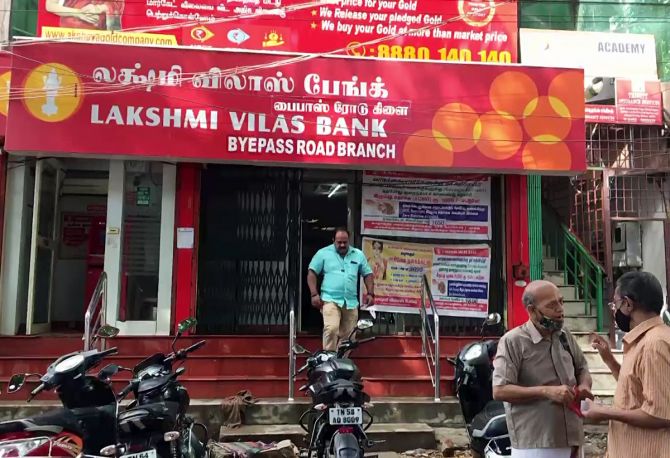Its obsession for growth, chasing corporate clients and giving up its original mandate of meeting the needs of local trade and businesses.
A quarter of its loan book has gone bad.
That's an error of business strategy, points out Tamal Bandyopadhyay.

Last month, the Reserve Bank of India declared a moratorium on Lakshmi Vilas Bank Ltd.
Before any of its depositors could think of rushing to the nearest ATM to withdraw money, the central bank released a draft scheme to merge the insolvent old private bank with DBS Bank India Ltd, the Indian arm of DBS Bank Ltd, Singapore, and appointed an administrator, superseding its board.
Nobody would shed a tear for the 94-year-old post-World War I bank, set up on the banks of the river Amaravathi in Tamil Nadu. But there's surprise in the profile of the white knight and the contour of the merger scheme, which rules out even a penny for the LVB promoters and investors.
The deal had been in the making for over a year. In September 2019, the RBI put LVB under its prompt corrective action net, restraining it from giving fresh loans.
LVB has dug its own grave with its obsession for growth, chasing corporate clients and giving up its original mandate of meeting the needs of local trade and businesses. A quarter of its loan book has gone bad. That's an error of business strategy.
The larger issue has been lack of governance.
One of its promoters was too keen to be the chairman of the bank, but the regulator did not allow this to happen since unlike the directors on a bank's board, who cannot continue beyond two terms at a stretch, the chairman can have a long innings till the age of 70.
This, of course, didn't deter the promoter from influencing most commercial decisions of the bank and even employment of senior executives as chairman of various board committees.
Why did the regulator take so long to sew up the deal? It had to clean up the Yes Bank Ltd mess first. Ten times bigger than LVB by assets, Yes Bank could have created a systemic problem.
Before that, in 2018, Fairfax India Holdings Corp of Indian-born Canadian billionaire Prem Watsa had acquired 51 per cent stake in CSB Bank Ltd (formerly Catholic Syrian Bank), which is smaller than LVB.
This was the first instance of a foreign company buying a majority stake in an Indian bank. Under the current norms, foreign investors can own up to 74 per cent stake in a private bank, but a single entity exposure is typically capped at 5 per cent, which can be raised to 10 per cent with RBI approval.
DBIL is not a foreign bank. It is DBS's Indian subsidiary. In 2006, when the distressed United Western Bank was up for grabs, both Standard Chartered Plc and CitiBank NA threw their hats into the ring, but none could get it.
While the LVB promoters were engaged in discussion with prospective investors for a possible stake sale, the RBI, which had seen the tail wagging the dog, had been working on Plan B.
The regulator had reached out to quite a few banks in the private sector and two of them, including DBIL, had put in their proposals in sealed envelopes.
DBIL clinched the deal since it was more liberal in its offer.
Had the promoters found a market-led solution, the RBI would not have needed to follow this path. But the promoters and some of the existing influential investors did not seem to be serious enough in their hunt for the rescuer.
After all, who wants to lose control over a pool of depositors' money that can be used for personal benefit?
No scheduled commercial bank has been allowed to fail since the economic liberalisation of 1991, although a few cooperative banks have fallen by the wayside.
Each time cracks surfaced in a bank's balance sheet, the RBI threw a protective ring around it and 'found' a suitor -- typically among public sector banks (PSBs) -- with the sole objective of protecting the interest of depositors and avoiding any systemic crisis.
In 2004, then zero-NPA Oriental Bank of Commerce took over Global Trust Bank.
A decade ago, in 1994, Bank of India was chosen to rescue Bank of Karad Ltd. There have been many such examples.
What are the messages from the LVB deal?
One, the RBI has changed its approach towards rescue of sick banks. The PSBs are no longer being used as a vehicle to protect the depositors of sick, and often mismanaged, private banks -- both old and new.
Along with preventing the not-so-efficient use of taxpayers' money, this also closes the gate for automatic entry of private sector bank employees into the PSB safety net.
Two, the LVB deal will encourage other foreign banks for local incorporation. The RBI is ready to treat such subsidiaries on a par with domestic banks, and the DBIL-LVB deal is a testimony to this.
So far, only two banks (DBS and SBM Bank Mauritius Ltd) have gone for local incorporation.
Three, the deal also sends a strong signal to the promoters and influential investors in the not-so-well-run banks to behave or lose their shirt.
Not all independent directors of LVB were independent in the truest sense of the term; a few of them were on the payroll of investors in the distant and not-so-distant past.
Most credit decisions were influenced by other considerations. At least a few investors seem to be holding higher stakes than what is officially known.
There won't be any surprise if the benami stakes, held through overseas entities, were bought by taking loans from LVB!
I am aware of at least one proposal of buying toxic assets from one investor to meet the priority loan norm of the RBI. The bank was also paying rent for a sprawling premises in Bengaluru, which it didn't need, till the RBI intervened. A promoter owns that premises.
Is it a great deal for DBIL? Time will tell.
DBIL needs to deal with a large heap of bad loans, besides uncertainties relating to a Rs 750-crore disputed transaction with the Religare Group.
On the positive side, there are 560-odd branches (85 per cent of which are in South India and half of that in Tamil Nadu) and 1.75 million retail customers. Bulk of the bad loans has been provided for.
DBIL will also get the income tax benefit for absorbing Rs 2,901 crore of LVB's past losses.
Finally, it needs to keep only two key managerial personnel (company secretary and chief financial officer) of the old regime.
Any foreign-origin bank that has a retail dream in India needs a strong branch network and a loyal clientele. LVB offers that.
Good luck, Surojit Shome*.
Tamal Bandyopadhyay, a consulting editor with Business Standard, is an author and senior adviser to Jana Small Finance Bank Ltd.
*Surojit Shome is the CEO-India for DBS Bank.
Feature presentation: Mahipal Soni/Rediff.com.











